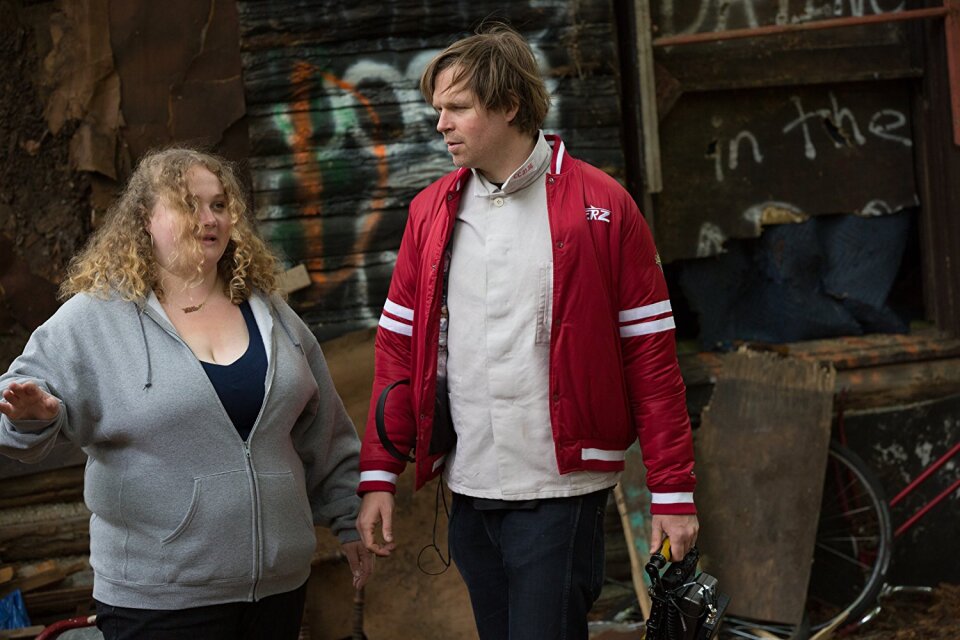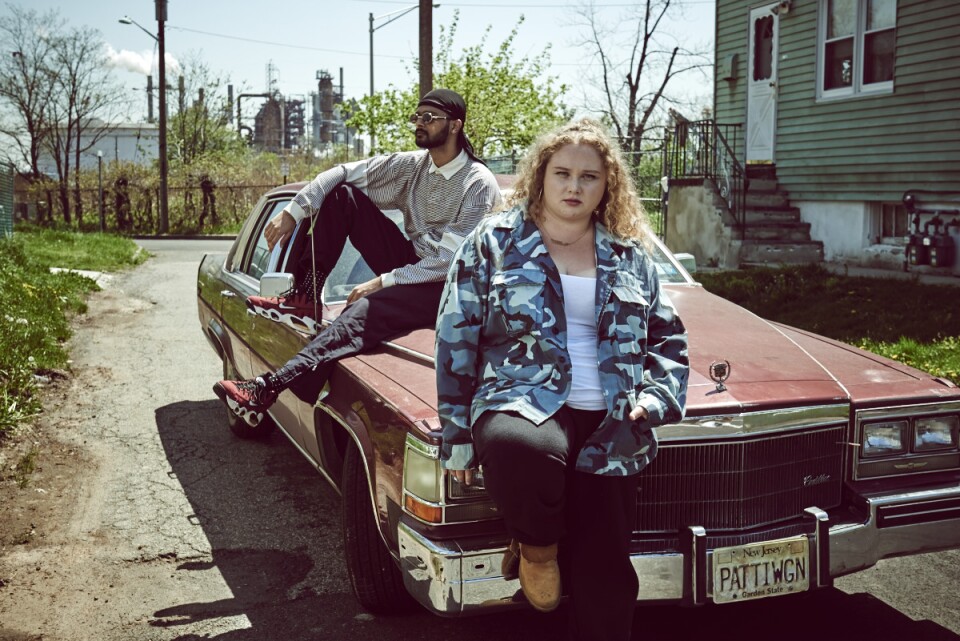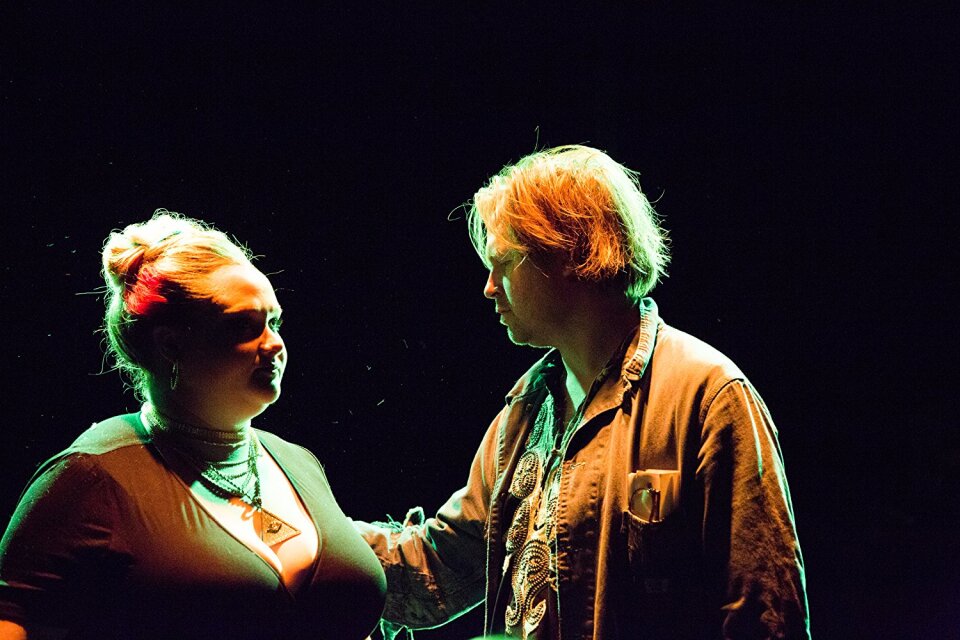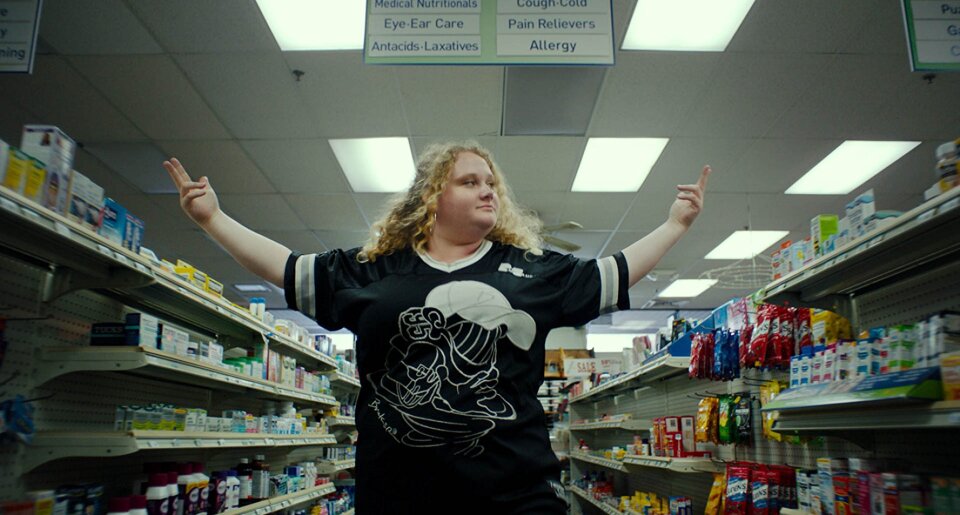In the wake of Hurricane Harvey, we revisit our recent interview with former Vice-President Al Gore about his latest climate change documentary; in "Patti Cake$," Danielle MacDonald plays a rapper from New Jersey whose rocky road is not unlike the path traveled by the actress herself.
'Patti Cake$' director Geremy Jasper drew from his musical past to make his first movie
You might know Geremy Jasper from The Fever, an indie band he co-founded in 2001. But these days, Jasper is better known as a filmmaker. He has directed music videos for Florence + The Machine and Selena Gomez, and his feature debut, "Patti Cake$," is a mash-up of his passions for music and film, inspired by his own life experiences.
"It's about where I grew up and about the people that I grew up around," Jasper says. "All those little things kind of built up to what would become Patti's little universe in Northern Jersey."
"Patti Cake$" follows Patricia Dombroski, a.k.a. Patti Cake$, a.k.a. Killa P, a hip-hop legend in the making. As a white, heavyset, 23-year-old Jersey girl, she's an anomaly in the rap game. But she's got a big heart and an even bigger talent.
The film debuted at the Sundance Film Festival this year and features a cast that includes Bridget Everett, Cathy Moriarty, Siddarth Dhananjay and Mamoudou Athie.
In some ways, Patti is Jasper's hip-hop alter-ego. The film is set in New Jersey, where he grew up, and, like Patti, he had dreams of leaving town to make it big. Jasper says some of his old songs could have been written by Patti.
"They were kind of Springsteen-esque, Take that bridge and tunnel into the city, let's get out, let's live a life of romance and danger," Jasper says. "Let's leave this small town behind kind of thing."

Jasper eventually left Jersey with his band, but the toil of touring caught up with him. He gained an interest in filmmaking after starring in "Glory at Sea," a short film by his friend and "Beasts of the Southern Wild" director Benh Zeitlin. Jasper learned from Zeitlin's do-it-yourself ethos of filmmaking, which inspired him to make his own movies.
Jasper stopped by The Frame to talk about his transition from music to movies, and how his own life inspired the making of the hip-hop movie, "Patti Cake$."
INTERVIEW HIGHLIGHTS:

On creating the character Patti Cake$:
In my early 20s, driving around Jersey, with my best friend who worked at the pharmacy ... I said, One day, there's going to be a girl from Jersey who takes over the rap game and she's going to be a mix of Mae West and Biggie Smalls and [have] the heart of Bruce Springsteen and a little, you know, Tony Soprano on top. She reminded me of my mom — a big woman who liked to wear jogging suits who's never gone jogging in her life ... who has no shame in her game and just has the attitude of, I am who I am and kind of like, F-U — this is who I am. We laughed about it and I kind of filed away this character.
On his background in songwriting:
I started writing my first rhymes at 9. The first thing I did on stage, I would like to say, it was very early "Hamilton." I did a rap about the constitution when I was in fifth grade. "The Constitution Rap" it was called ... It was like, Yo, I wanna tell you about something great / it was signed and designed in the United States. That's the first line I remember. It could be worse for a nine-year-old. Check that out, Lin [Manuel-Miranda] (laughs). I was writing all the time. It was kind of how I kept a diary, writing these ridiculous rhymes.

On making the transition from music to film:
Years went by, I finally got out of Jersey with that guy who worked at the pharmacy. We started a band and we made some records and went on tour. And I thought that was going to be my big dream come true, but it wasn't. We were playing for five people in Columbus, Ohio on a Tuesday night. It was pretty dark. It was the bottom of the music industry, kind of scratching my way through. And then it got to a point where I was like, Alright, I'm not doing this anymore.
I discovered the films of Fellini and David Lynch and I realized, Oh my god, there's, like, a whole 'nother world that I didn't even know out there. And I was kind of intoxicated by these things and said, I wanna learn how to direct. But I still was really intimidated by it ... And then I met Benh Zeitlin, who was kind of like my beacon through this time period. We'd collaborated on a music video, we really connected, we had very similar tastes in music. And so there was sort of a brotherhood that was established. And then he was going to New Orleans to shoot his first short called "Glory at Sea." He called me — and my band had just broken up — and he said, Do you wanna come to New Orleans? I always had a very sweet spot for New Orleans and I said, Yeah, okay.
On what he learned in film that he didn't in music:
It was storytelling, it was characters, it was heavily musical. So I realized ... wow, you can still write songs and music and melodies, but now you combine it with these characters and these incredible locations and it all comes together with something that felt so much more overwhelming and scary and intimidating. I don't know, it was just a really great combination. It was everything that I loved doing all-in-one. And watching [Zeitlin] work, I realized, Oh, there's like a DYI kind of garage band quality to the way these guys are making these films.

How "Patti Cake$" is an authentic representation of his New Jersey hometown:
It's about where I grew up and about the people that I grew up around. There was a frequency I just needed to kind of tap into ... You know, Jersey can be a little bit of a punchline. ... ["The] Sopranos" is obviously the gold standard and they did it really, really well. But there are other films and TV shows that it's like, Ey yo! Ey! ... Welcome to Jersey! I just wanted to make sure we didn't get into that place.

On Jasper's personal connection to the character Patti Cake$:
I was living at home with my parents in their basement in a house that was quite disheveled, and had this burning desire to make things, to be an artist, to be a musician ... But I had nothing to show for it. It wasn't like I could really play an instrument. All I had were these notebooks and this dream of getting out. And I felt my family — I guess it's three or four generations Jersey strong — I seemed to be the first one in the clan that wanted to get out. Ever since I was 16-years-old, I had this kind of burning desire to get out of Jersey. At that time I was like, I'm trapped ... I was pretty depressed and just didn't know what I was going to do with my life, felt very lost. And so that sensation, which took years and years to work through and claw my way out [from], I always try to tap into that sensation with Patti's story and where Patti's coming from.

To listen to John Horn's full interview with Geremy Jasper, click on the player above.
Al Gore believes the internet might be the answer to 'fake news'
In the age of "fake news," Al Gore still believes in facts.
"I simply refuse to give up on the role of truth, and reason, and facts, and the best available evidence as the lifeblood of self-governance and representative democracy."
The former vice president is back on the big screen Friday with the hopes that his latest film, “An Inconvenient Sequel: Truth to Power," will inspire others to think about just that — the facts.
Eleven years after his Oscar-winning documentary, “An Inconvenient Truth," shed light on the impact of fossil fuels on the environment, many of the scientific predictions presented in that movie have come true. In some cases, the results have been worse than anticipated.
His latest film offers case studies of positive change that may give some reason to hope for a more conscientious future.
He also praises leaders like Gov. Jerry Brown for taking action to make an impact.
An Inconvenient Sequel trailer
Directors Bonni Cohen and Jon Shenk worked with Gore to make a documentary with a timely message. They had already finished filming when Trump announced that the U.S. would withdraw from the Paris climate agreement. After the president’s decision, Cohen and Shenk added new footage and recut the film.
Gore recently sat down with The Frame's John Horn to discuss the role that documentaries can play in society and where he finds reason to hope for meaningful action on climate change.

You can hear their conversation by clicking the play button at the top of this page. Below are some highlights.
Interview Highlights
On how he reacted to Trump pulling out of the Paris Agreement:
I worried a lot that if the U.S. pulled out of Paris, other countries might use it as an excuse to pull out themselves. That's one of the reasons I spent a lot of time talking with the president-elect and then after he entered the White House, President Trump, to try to convince him to come to his senses. I was not able to do that.
But after he made his speech, I was tremendously gratified that the entire rest of the world redouble their commitment to the Paris agreement, almost as if they were saying to him, we'll show you. And then governors, mayors and business leaders in large numbers stepped up to fill the gap and said, we're still in Paris. And it now looks as if the U.S. may meet our commitments under the Paris agreement in spite of Donald Trump.
On how "An Inconvenient Sequel" differs from "An Inconvenient Truth":
There are two big changes in the last decade since the first film came out. The first is that, unfortunately, the climate-related extreme weather events are a lot more common and more destructive. That's waking a lot of people up. But the second change is that we really do have the solutions now.
It is astonishing that the cost of electricity from solar and wind is well below the cost of electricity from burning fossil fuels in many, many regions of this country and the world. The cost continues to come down every year. It will soon be lower than the cost of fossil energy everywhere in the world. That's a big difference. So we wanted to tell people the danger is even greater now, but we're gaining on it and we have the solutions now.
On the role of documentary film in the public conversation:
Documentary films occupy a privileged and unique place. It's really the only place where people can sit in a communal setting for 90 to 100 minutes and really give their attention to a well-reasoned, well-documented, well-fact-checked argument that goes from soup to nuts and leaves you with a comprehensive understanding of the subject that they're exploring. I think that's maybe one of the reasons why so many people are saying that we're now in a golden age of documentary film.
On not feeling despair in the face of climate change:
It is an emotional experience, and if you have immersed yourself in the scientific data, it's an entirely different experience to really see it firsthand. Yes, it's tragic, but that sense of tragedy cannot and must not produce despair. Despair is just another form of denial.
For a long time, we have faced the reality that the maximum that is politically possible is still far short of what the laws of physics require. But a famous economist, Rudi Dornbusch (now deceased), once said: a change takes longer to happen than you think, and then it happens much faster than you thought it could.
That pattern has characterized all of the great moral causes that have advanced the cause of humanity. Like the civil rights movement and others, the climate movement is now at that inflection point. My fondest hope is that this movie will add to the momentum for change that's absolutely essential to our future.
On what audiences can do to combat climate change:
Number one, it's important to learn about it. Deepen your understanding and that will give you confidence that you can win the conversations about climate. I saw, as a boy growing up in the South, how the conversations about civil rights preceded the changes in the laws.
Number two, in addition to using your voice to win those conversations, use your vote to tell candidates for office and elected officials that this is important to you. And their ability to remain in office will depend, if you have anything to do with it, on whether or not they do the right thing on climate.
And then use your choices in life, including in the marketplace. When you insist upon the climate-friendly alternatives, that not only reduces your own personal impact, it sends a powerful message to business. And when enough people do that, more and more businesses decide to be a part of the solution. And that's already happening.
On combating fake news with truth:
The age of the internet, even with all of its problems, empowers individuals to learn the truth, spread it, gather others who agree with your point of view and then use reason-based argument as a basis for bringing about rational change that can save the future of our civilization. I don't think that is a Pollyanna-ish view.
I see bloggers now affecting the debate. I see internet media now having a big impact. I see candidates now rejecting special interest money and big contributors and relying on internet-based individual contributions in small amounts. I think the future of our democracy is what we choose it to be, and if we decide that we're going to redeem the promise of America, we have the ability to do that.
For more stories like this, subscribe to The Frame podcast on Apple Podcasts or Stitcher.




